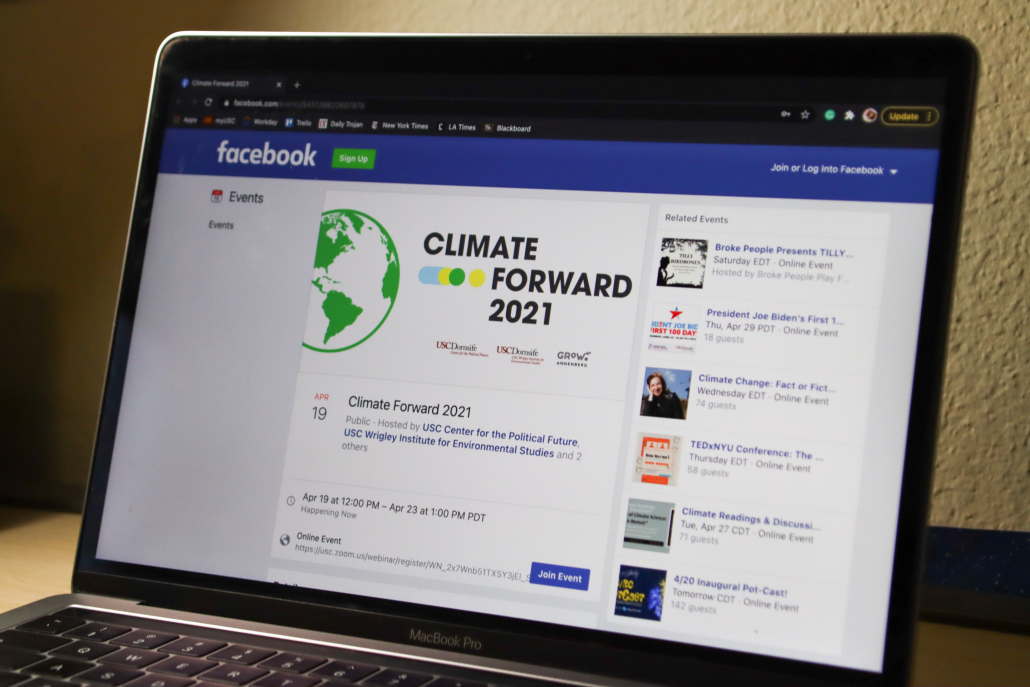Annual climate conference kicks off virtually

The Climate Forward 2021 event kicked off Monday with its first virtual roundtable discussion. The solutions-based climate change conference will take place throughout the week, taking a break on Thursday for both a Wellness Day and Earth Day, according to Kamy Akhavan.
Akhavan, executive director of the USC Center for Political Future, represents one of several organizations involved in Climate Forward 2021. In addition to the Center for the Political Future, both the USC Wrigley Institute for Environmental Studies and GRoW@Annenberg will collaborate to host the week-long discussion about climate issues.
Jessica Dutton, associate director for research and engagement at Wrigley Institute, highlighted this collaboration as a key part of the program since its inception in 2019.
“To truly address climate issues, we need to understand the social and political factors that both underpin the problems and that empower meaningful change,” Dutton said.
The conference brings together leaders from business, government and academia to talk about climate change solutions, Dutton said. Despite the virtual pivot, this year will be no different with a wide cast of speakers scheduled for the week’s panel discussions.
The discussions will take place throughout the week of April 19, and each day will look at climate change and sustainability through a different lens, from climate and partisanship to climate in business.
Monday’s roundtable was centered on climate justice and examining how some communities are harmed more by climate change and climate-related policies than others. Speakers included the director of the NAACP Environmental and Climate Justice Program as well as Los Angeles City Councilmember Kevin de León.
“People of color [and] people with less means are being disproportionately hurt by a lot of our policies, so we want to be very mindful and focus on solutions for that,” Akhavan said.
Tuesday will see a shift of focus to the business side of climate change and how businesses can and should be held more accountable to mitigate the effects of climate change. Leaders from Microsoft, Patagonia and Ford Motors will attend to discuss their own intentions to mitigate climate change, Akhavan said.
On Wednesday, panelists will discuss how ideas about climate change vary within and across state and party lines, along with how to communicate with people who hold different perspectives on the issue. Akhavan gave an example of these differences by comparing blue states like California to red states like Texas or Oklahoma.
“There’s a different kind of language, a different kind of appeal, that will really resonate with Republicans and red-state folk more than it will with blue-state and Democrat-leaning folks, so that day is all about understanding what those differences are because we all want the same goal. We want to save our planet,” Akhavan said.
Speakers will range from a climate scientist to U.S. Rep. Garret Graves.
After the break on Thursday due to the Wellness Day, when participants are encouraged to participate in Earth Day activities like cleaning up public spaces, Climate Forward 2021 will conclude with a conversation with local elected leaders, including California State Sen. Ben Allen, about the future of climate change in Southern California.
Despite a diverse schedule of topics, one theme ties it all together: climate solutions. Akhavan said the motivation behind the creation of the conference was to provide a climate conference that went further than just focusing on the problem of climate change and instead maximized awareness in a constructive and solutions-oriented way.
“We know the problem is bad,” Akhavan said. “We don’t need to talk about the problems. We need to focus on the solutions.”
Yet the conference had to focus on a problem of its own this year with the move to an online forum.
Despite the shift, the organizers remain steadfast in wanting to bring the conference back for its third year. In past years, the event took place with multiple panels in one day. However, in an effort to combat Zoom fatigue, Akhavan said the panels are spread out over the course of the week. Each day of the conference will consist of a 45-minute panel discussion followed by a brief question and answer session.
“Moving online has obviously limited certain elements of the program, particularly our ability to engage students directly with the speakers,” Dutton said. “That’s been a special part of the event in the past. But with online webinars, we are able to include a wider range of guests from across the country and to try different formats, such as this year’s multi-day series.”
The organizers hope the conversations will connect both the science and policy aspects of climate change to discuss and find real solutions. Oftentimes, climate change can seem too difficult of an issue for one individual to take on, but this is not always the case.
“The purpose of this conference is to make us aware of what we as individuals can do across a variety of the solutions spectrum,” Akhavan said. “ But it’s also intended to show us what can be done more institutionally — more systemically — and how can we contribute to those as well.”
Other on-campus organizations, such as the Environmental Student Assembly, have encouraged students to attend the conference. Jackson Fitzgerald, executive director of ESA, described what he hoped conference participants would take away from the discussions.
“If they’re able to see these types of figures in those fields talk about these things, then hopefully that can encourage them to both bring sustainability into their current lives and also bring sustainability into the great careers they’re building at the university,” Fitzgerald said.
You can register for the conference here.

